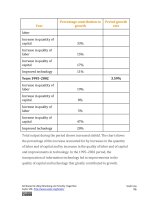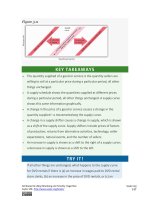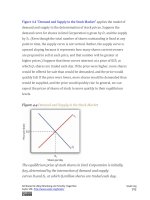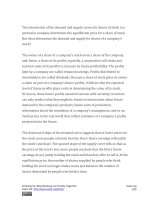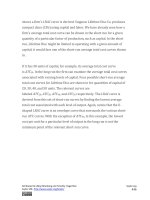Authors libby rittenberg 758
Bạn đang xem bản rút gọn của tài liệu. Xem và tải ngay bản đầy đủ của tài liệu tại đây (354.56 KB, 1 trang )
monopsony power. And, as we have seen, a firm with monopsony power
may respond to an increase in the minimum wage by increasing
employment.
The difficulty with implementing this conclusion on a national basis is
that, even if firms do have a degree of monopsony power, it is
impossible to determine just how much power any one firm has and by
how much the minimum wage could be increased for each firm. As a
result, even if it were true that firms had such monopsony power, it
would not follow that an increase in the minimum wage would be
appropriate.
Even the finding that an increase in the minimum wage may not reduce
employment has been called into question. First, there are many
empirical studies that suggest that increases in the minimum wage do
reduce employment. For example, a recent study of employment in the
restaurant industry by Chicago Federal Reserve Bank economists Daniel
Aaronson and Eric French concluded that a 10% increase in the
minimum wage would reduce employment among unskilled restaurant
workers by 2 to 4%. This finding was more in line with other empirical
work. Further, economists point out that jobs have nonwage elements.
Hours of work, working conditions, fellow employees, health insurance,
and other fringe benefits of working can all be adjusted by firms in
response to an increase in the minimum wage. Dwight Lee, an
economist at the University of Georgia, argues that as a result, an
increase in the minimum wage may not reduce employment but may
reduce other fringe benefits that workers value more highly than wages
themselves. So, an increase in the minimum wage may make even
workers who receive higher wages worse off. One indicator that suggests
Attributed to Libby Rittenberg and Timothy Tregarthen
Saylor URL: />
Saylor.org
758
